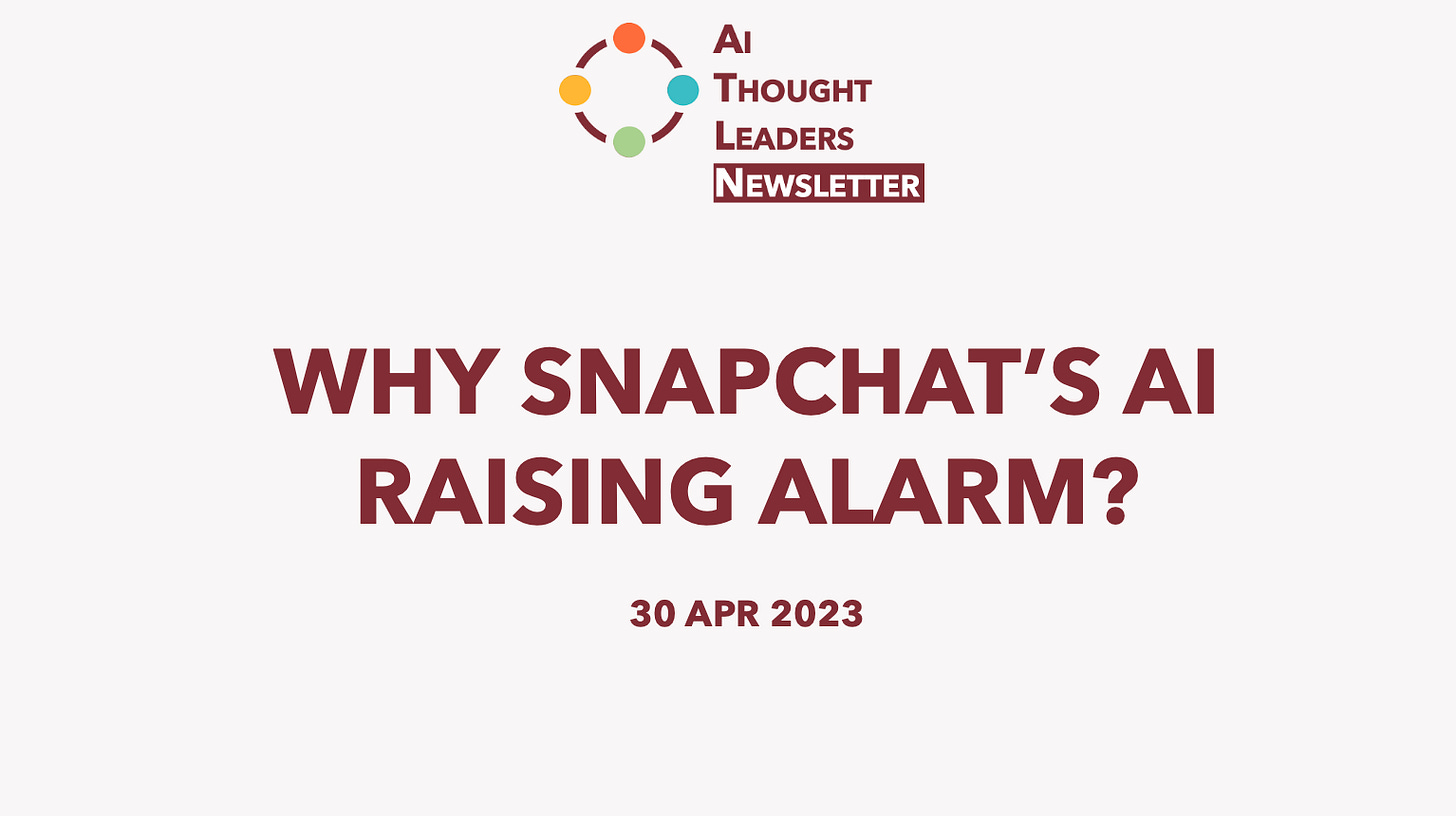ATL #04 Why Snapchat's AI raising alarm? 😲
Plus: AI in ICU to aid complex decision
Reading time 4min; Characters 4776; Words 808
Hello Humans,
How are you all? Lots of ❤️ poured by you folks to this newsletter. My AI engine got emotional! Hit that reply button to share what you like and dislike as we believe in feedback loop!
Back to business now.
Let’s see what’s AI trends in this week:
Snapchat’s AI raising alarms 😲
AI in ICU to aid complex decision 🩺
Quick AI BYTES for snacking 🍟
Learning of the week: Algorithm🧑💻
😲 Snapchat’s AI raising alarms
What is Snapchat?
Snapchat is a social media service primarily based on sharing ephemeral photo and video content. California company’s app is extremely popular with millennials, who make up its primary demographic.
My AI
Snapchat is the latest app to bring OpenAI’s ChatGPT experience to its (paid) users. The platform calls the integration “My AI” and pitches it to get birthday gift ideas, plan trips, suggest recipes, and more inside Snapchat
Concerns & Risks
My AI, has received backlash from parents and users over privacy concerns, inappropriate exchanges and the inability to remove the feature from their chat feed unless they pay for a premium subscription.
The new feature offers recommendations, answer questions and converses with users, much like the viral AI chatbot tool ChatGPT, but can be customised with a name and a custom avatar, making it less clear users are speaking with a computer.
The mixed reactions highlight the risks that companies face in rolling out new generative AI technology to their products, particularly in products like Snapchat, whose users skew younger.
Company’s response
Snapchat told it continues to improve My AI based on community feedback and is working to establish more guardrails to keep its users safe.
Ethical use of AI
Apps like these once again creating noise of the eithical & responsible use of AI to aid humanity.
🩺 AI in ICU to aid complex decision
Researchers from Carnegie Mellon University’s HCII collaborated with physicians and researchers from the University of Pittsburgh and UPMC to study the use of AI in ICU to help clinicians make complex decisions for critically ill patients.
The study provided 24 ICU physicians with an AI-based tool called the AI Clinician Explorer, which uses the AI Clinician model to provide recommendations for treating sepsis based on a data set of over 18,000 ICU patients diagnosed with sepsis.
The tool allows clinicians to filter and search for patients, visualize their disease progression, and compare model predictions to actual treatment decisions. While AI has the potential to aid clinicians in the ICU, further research is needed to address the challenges of implementing such technology.
Some clinicians expressed concern about the limited access to patient data that AI has and were sceptical of recommendations that went against traditional teaching.
Venkatesh Sivaraman, a Ph.D. student in the HCII and member of the research team explains: “It’s impossible for any one human to amass all that knowledge to know how to do things best in every situation. So maybe AI can nudge them in a direction they hadn’t considered or help validate what they consider the best course of action.”
🍟 Quick AI BYTES for snacking
OpenAI complies with regulations to lift the ChatGPT ban in Italy
Tech companies pouring money on AI by cutting human manpower
US senator urges AI company CEOs to take steps to address risks
Japan PM supports industrial use of generative AI
Britain sets up $125 million taskforce to drive AI in Education & Healthcare
🧑💻 Learning of the week: Algorithm
What is ALGORITHM?
Hey there! Have you ever played a game of follow the leader? The leader is the one who decides where to go and what to do, and everyone else follows along. Well, an algorithm is like a set of instructions that tells a computer what to do, just like a leader telling their friends what to do.
Imagine you're a computer and I'm going to give you a set of instructions to follow. First, you need to take three steps forward. Then, you need to spin around in a circle three times. Finally, you need to jump up and down two times. You just followed an algorithm!
Algorithms are like recipes that tell the computer what to do step by step, just like a recipe tells you how to make your favorite cookies. And just like you can follow a recipe to make your cookies turn out just right, computers can use algorithms to do all sorts of things like play games, solve puzzles, or even help doctors treat sick patients!
That's all we have for this week! Tell us how you feel either by hitting a reply or comment. One lucky reader will have a surprise from us!
We love feedbacks 🫶
See you next week 7 May at 14:00 HKT / 06:00 GMT













Great articles! So many things at one place. Awesome effort. Keep going, Varun.